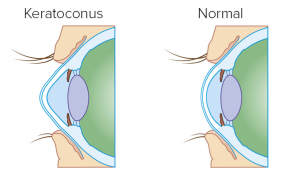Keratoconus Management in Apex and Zebulon, NC
Optometrists Specialized in Keratoconus Lens Fittings, Treatment, and Co-management
Keratoconus is a rare eye disease with genetic predisposition that affects approximately 1 in 2,000 Americans. The experienced optometrists at NC Eye Associates are committed to providing comprehensive eye examinations that can detect keratoconus.
What is a Keratoconus?
A normal cornea has strong bonds and is dome shaped. Keratoconus is a condition of the cornea that results in progressive thinning and subsequent warpage causing the cornea to form the shape of a cone. This misshapen cornea results in an inability to focus light appropriately to provide clear vision with traditional optical devices like glasses and soft contact lenses.

In a small number of severe cases the cornea will swell causing pain and a significant decrease in vision. This occurs when tiny cracks evolve on the posterior surface of the cornea allowing fluid into the cornea. This is called hydrops. As the cornea heals, some scarring may develop leaving you with cloudy vision. In a few cases, surgical intervention is necessary.
The onset of keratoconus typically occurs in younger people in their teens or early 20’s. It typically occurs bilaterally, and is progressive over a 10-20 year period.
What causes Keratoconus?
No one knows for sure. However, the disease is often inherited, and it is also associated with excessive eye rubbing.
Keratoconus Symptoms
Keratoconus is rare and the symptoms sometimes aren’t obvious, especially if you already have a history of vision problems and wear corrective lenses.
Here are some common symptoms of keratoconus:
- Light sensitivity and glare
- Distorted or blurred vision through glasses or contacts
- Discomfort while wearing contact lenses
- Nearsightedness
- High levels of astigmatism
- Eye pain, redness, and cloudy vision in more severe cases
Solutions for patients with Keratoconus
Since keratoconus is a progressive eye disease, early diagnosis from regular eye exams is critical to achieving the best possible prognosis.
Treatment for keratoconus largely depends on how far along the disease has progressed and how quickly that progression occurred. Most patients with this condition benefit significantly by wearing specialty scleral contact lenses to correct their vision. Surgical procedures are only required in the most advanced cases.
Treatment Options
Here are a few treatment options for keratoconus patients:
Scleral Contact Lenses
These are specially designed gas permeable (GP) contacts that are customized for each individual’s eyes. Unlike standard GP contacts, scleral lenses are larger in diameter and have little or no lens movement during blinks, making them more stable on the eye and extremely comfortable. They mask the warpage caused by the keratoconus providing the ability to give the patient clear vision again. The use of scleral contact lenses is largely accepted as the best option for correcting vision in patients with keratoconus.
Corneal Crosslinking
This procedure strengthens corneal tissue with the use of UV-light and riboflavin to halt the progression of keratoconus.
Intacs
These are small curved devices that a cornea specialist surgically inserts into the corneal stroma. They flatten the curve of your cornea to help reduce visual distortion and improve the ability to tolerate soft contact lenses.
Corneal Transplant
This procedure is designated, only, for the most severe cases and is carried out by a corneal specialist.
Vision Correction for Keratoconus Patients
While this disease doesn’t cause blindness, your vision can be seriously impaired and prevent you from participating in everyday activities. A common misconception by some is that if you have an irregularly shaped cornea like those with keratoconus, you cannot wear contact lenses. This is not always the case, as there are special lenses, known as scleral contacts, that can help to correct your vision.
Scleral Contact Lens Fittings for Patients with Keratoconus
Scleral contacts are custom-made for each individuals eye to achieve the most comfortable fit and best vision — a big benefit for those seeking visual relief from keratoconus.
If you are being treated for keratoconus and require contact lenses, getting fitted by an experienced scleral CL specialist is recommended. Our Apex and Zebulon optometry locations offer the highest quality lenses and latest technologies to help achieve the best possible fit.
Keratoconus Eye Care in Apex and Zebulon, NC
The optometrists at NC Eye Associates offer whole-health eye care services that include keratoconus treatment, co-management, and scleral contact fittings. Don’t allow your keratoconus vision problems to hold you back any longer. Contact our optometry team to make an appointment with our eye doctors.
Request an appointment with NC Eye Associates to schedule your exam and keratoconus screening today!

